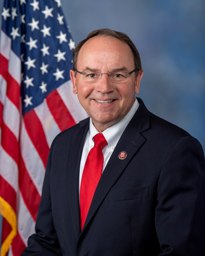Tom Tiffany and a Review of Wisconsin US Representatives Running for Governor
The Wisconsin congressman is poised to launch a bid to become the first sitting U.S. House member to win the governorship in state history
 Four-term Wisconsin U.S. Representative Tom Tiffany is expected to launch his campaign for the 2026 Republican gubernatorial nomination in Wausau this Wednesday as the field for Governor Tony Evers’ open seat continues to grow.
Four-term Wisconsin U.S. Representative Tom Tiffany is expected to launch his campaign for the 2026 Republican gubernatorial nomination in Wausau this Wednesday as the field for Governor Tony Evers’ open seat continues to grow.
Rep. Tiffany would join Washington County Executive Josh Schoemann and Whitefish Bay manufacturing executive Bill Berrien as announced GOP hopefuls (along with a half-dozen Democrats) now 11 months out from the state’s August 2026 primary.
Tiffany would also seek to reverse a trend of more than a century of failed campaigns by sitting or former U.S. Representatives for the governor’s office in Wisconsin, and become the first successful such candidate for the office during the state’s direct primary era.
Since statehood, only three Wisconsin U.S. Representatives have gone on to win the governorship – but none during the last 120+ years and none ever as a sitting member of the chamber.
The first member of the U.S. House to run for governor from Wisconsin was U.S. delegate John Tweedy in May 1848.
Tweedy served the Wisconsin Territory from 1847 until May 1848. Instead of running for U.S. Representative at statehood, Tweedy was the Whig nominee to become the first statehood governor. Tweedy lost to former Territorial legislator and council president Nelson Dewey by 14.8 points.
In 1871, Republican Cadwallader Washburn became the first ex-U.S. Representative to win the governorship in Wisconsin. Washburn had recently exited congress after his fifth nonconsecutive term in the nation’s lower legislative chamber (1855-1861, 1867-1871) when he won the Republican gubernatorial nomination later that year.
Washburn defeated his Democratic opponent – former Republican U.S. Senator James Doolittle – by 6.4 points and served one two-year term before being unseated by former state legislator William Taylor in 1873.
Less than 10 years later, in 1881, former three-term Republican U.S. Representative (1871-1877) Jeremiah Rusk won his first of three gubernatorial terms with a 7.0-point victory over former State Senator Nicholas Fratt. Rusk would also win a rematch against Fratt by 6.0 points in 1884.
In 1886, Democrats nominated former one-term U.S. Representative (1883-1885) Gilbert Woodward of La Crosse. But Governor Rusk won a third consecutive competitive race – by 6.5 points over the ex-La Crosse Mayor.
The next former U.S. Representative to make a run at the governorship was Republican Robert La Follette in 1900. La Follette won three terms from the Madison area 3rd CD (1885-1891) before getting unseated during the 1890 Democratic wave.
A decade later, ‘Fighting Bob’ won three gubernatorial elections – all by double-digits – the first in 1900 by 23.4 points over Kenosha attorney Louis Bomrich.
Following La Follette’s victories, sitting or ex-U.S. Representatives have been on a losing streak of nine consecutive gubernatorial bids:
- 1928: Sitting four-term Republican (1921-1929) Joseph Beck lost his party’s primary by 4.1 points to business executive Walter Kohler, Sr.
- 1940: Former three-Democrat (1933-1939) Raymond Cannon placed third in a four-candidate primary with 22.0 percent
- 1942: Cannon placed third again in a six-candidate primary with 17.6 percent
- 1978: Sitting two-term Republican (1975-1979) Bob Kasten lost a head-to-head primary against University of Wisconsin-Stevens Points Chancellor Lee Dreyfus by 15.8 points
- 2002: Sitting five-term Democrat (1993-2003) Tom Barrett lost a three-candidate primary to Attorney General Jim Doyle by 3.9 points with 34.5 percent of the vote
- 2006: Sitting four-term Republican (1999-2007) Mark Green lost the general election by 7.4 points to Governor Jim Doyle
- 2010: Former two-term Republican (1995-1999) Mark Neumann lost a three-candidate primary by 19.9 points to Milwaukee County Executive Scott Walker with 38.7 percent
- 2010: The aforementioned Tom Barrett lost the general election to Walker by 5.7 points
- 2012: Barrett also lost the subsequent Walker recall election by 6.8 points
Multiple gubernatorial candidates later went on to win U.S. House seats such as the Free Soiler Charles Durkee (1848 gubernatorial bid), Republican Merlin Hull (1914, 1920), Robert Henry (1938, as a coalition candidate winning the Democratic primary and placing second in the GOP primary in the same cycle), and Republican Vernon Thompson (1956, 1958).
Follow Smart Politics on X.
